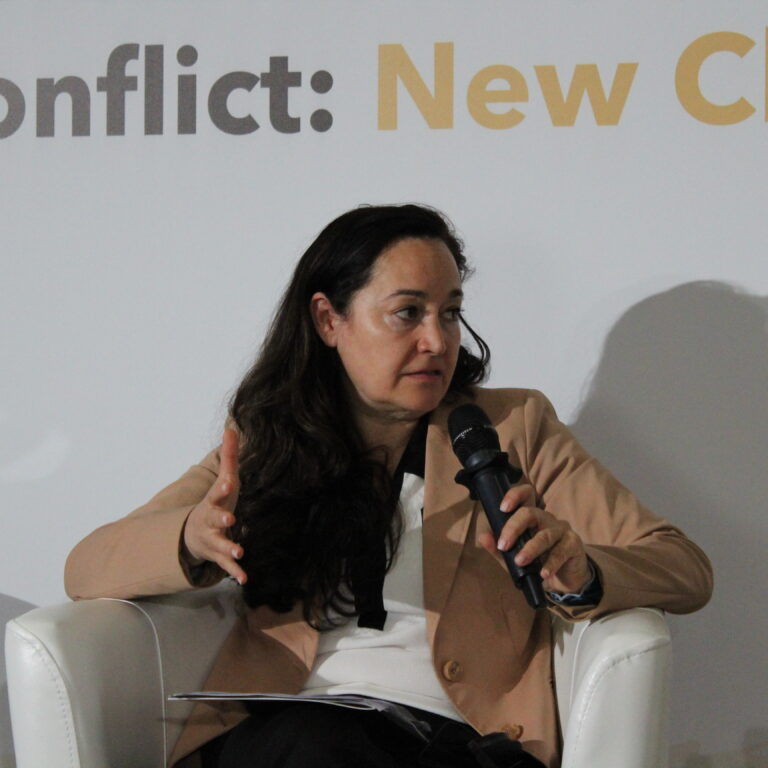Despite the world isolation and sanctions against russia for military aggression against Ukraine, occupation of its territories, including the Crimean peninsula, the aggressor country is always constant in its manner of responding to the deteriorating situation within itself. This is especially true in the economic sphere. “State Duma” functionaries and Kremlin propagandists actively deceive their own citizens, blatantly taking advantage of their ignorance and low level of economic literacy.
Recently putin personally stated that allegedly “Sberbank” (the largest bank in russia) “has not only passed through this difficult period, but has almost completely recovered its work: it is working at a profit, stable, rhythmically – and this is also one of the signs of the stability of our (russian) financial system”.
But these words, not surprisingly, do not coincide with reality. The proposals coming from the Kremlin about the criminal introduction of “Sberbank’s” activities into the occupied Crimea are a farce and an absolute risk, based on the bank’s already disappointing performance today. It should be reminded that the global sanctions against the aggressor’s financial structure to the fullest extent have not yet shown their effectiveness to the full extent, because the mechanism itself resembles a slow stranglehold on the bank, which will lead “Sberbank” to non-material “death” in any case, even if the putin oligarchs decide to somehow “support” the absolutely unprofitable bank in the future.
Officially, “Sberbank” in 2022 reduced the net profit according to IFRS by 4.6 times, which is 78.3%. That is, the income fell to 270.5 billion rubles, compared with 1 trillion 245.9 billion rubles of profit in 2021. “Sberbank” chairman Herman Gref said that 2022 was the most difficult year for the country and the banking sector, and it is true. “Sberbank” has been under sanctions since 2014, and even though they were not as effective as the current restrictions, the bank at that time had already opened a conditional “Pandora’s Box” that was gradually poisoning it.
Let us remind you the chronology.
Following the occupation of the Crimean peninsula in 2014, russia “came face to face” with targeted sanctions from the US Treasury Department for the first time, as decided by the US Presidential Administration on 12 September 2014. The Office of Foreign Assets Control (OFAC) then added both “Sberbank” and other russian financial institutions to its list of the Supplemental Security Income (SSI). Earlier, on 31 July 2014, “Sberbank” and other aggressor institutions were on a similar list of sanctions imposed by the European Union. The sanctions mainly consisted of restricting access to EU and US capital markets. Following the announcement of the restrictive measures, “Sberbank’s” rating plummeted in market value among all major lenders worldwide, plus foreign investors stripped the bank of $22 billion. On 27 August 2014 Switzerland imposed sanctions against Sberbank and other Russian financial institutions, and on 22 December 2015 the United States adopted additional sanctions against “Sberbank” and its subsidiaries.
Following the occupation of the Crimean peninsula in 2014, russia “came face to face” with targeted sanctions from the US Treasury Department for the first time, as decided by the US Presidential Administration on 12 September 2014. The Office of Foreign Assets Control (OFAC) then added both Sberbank and other russian financial institutions to its list of Supplemental Security Income(SSI). Earlier, on 31 July 2014, “Sberbank” and other aggressor institutions were on a similar list of sanctions imposed by the European Union. The sanctions mainly consisted of restricting access to EU and US capital markets. Following the announcement of the restrictive measures, “Sberbank’s” rating plummeted in market value among all major lenders worldwide, plus foreign investors stripped the bank of $22 billion. On 27 August 2014 Switzerland imposed sanctions against “Sberbank” and other Russian financial institutions, and on 22 December 2015 the United States adopted additional sanctions against Sberbank and its subsidiaries.
Nevertheless, “Sberbank’s” share price rose by 89% during 2015, which was due to the lack of a mechanism to respond to russia’s circumvention of the restrictions through third countries. However, it is worth remembering that the increase has failed to bring back the former earnings statistics and creditor confidence in the bank. In the first three months of 2015, “Sberbank” russian federation’s net profit was RUB 26, 32 billion, although in the same period in 2014, before the official occupation of Crimea and the start of the military invasion of Ukraine, income was RUB 99, 3 billion. At 3.8 per cent, earnings statistics deteriorated.
In May 2015, the head of “Sberbank” explained at the annual meeting of shareholders that the bank was not planning to start operations in occupied Crimea because of sanctions. If putin, who does not have a special understanding of even the most elementary fundamentals of the economy, nevertheless pushed through the decision to open “Sberbank’s” activities on the territory of the occupied peninsula – what the bank faced in 2022 would have happened even earlier. The Kremlin’s influence over “Sberbank” is completely unhidden behind the scenes of some “personal arrangements”. Absolutely everyone, including russian citizens, knows that “Sberbank’s” main shareholder is the so-called “Russian National Welfare Fund”, which is directly managed by the russian Government (until 2020 by the Central Bank of Russia). This “fund” owns shares in the bank on a “50% + 1” system, i.e. ordinary depositors and shareholders, whose share is 49%, have absolutely no influence on what decisions “Sberbank’s” management takes. In the event of any problems with the investment – these 49% risk receiving no compensation. Without a change in russian law, the situation cannot change.
On 24 February 2022, in connection with russia’s full-scale invasion of Ukraine, “Sberbank” once again came under US sanctions, for which US financial institutions closed all correspondent accounts of the institution and stopped carrying out any transactions involving it within 30 days. Immediately, “Sberbank’s” shares lost more than half of their value. There was also an urgent decision to disconnect all financial institutions in russia from the international transfer system SWIFT.
Visa and Mastercard suspended their operations in the aggressor state in early March 2022. Their cards issued by russian banks, including “Sberbank”, no longer worked outside russia, and cards issued outside the terrorist country – could no longer be used in russia itself.
On 25 February 2022, the bank was added to Canada’s sanctions list; on 28 February, “Sberbank’s” European branch was already threatened with bankruptcy because of sanctions. Deutsche Börse, a German subsidiary of “Sberbank”, suspended trading in “Sberbank” shares. Two days later, “Sberbank Europe”, which is also a subsidiary, announced its withdrawal from the European market as it became bankrupt. On 6 April, it was also placed on US sanctions lists. In the same year, Japan and South Korea joined the sanctions.
The bank was also hit by Australian sanctions in 2022. On 12 April, the “Sberbank Online” mobile app was removed from the App Store and a day later from Google Play. On 15 April, GitHub blocked the bank’s account. On 19 April, the bank was added to New Zealand’s sanctions lists.
On 21 July 2022, the bank was finally added to the EU sanctions list, freezing all assets in European countries and prohibiting transactions except for financial transactions in food and fertilizer trading. On 3 August 2022, Switzerland added “Sberbank” to its sanctions list and blocked its savings.
On 15 December 2022, “Sberbank Europe AG’s” banking licence expired and can no longer be renewed to continue its operations. On 29 December 2022, “Sberbank CIB Ltd” (UK) and SIB Limited (Cyprus) were suspended as member firms on the London Stock Exchange and their activities were halted. Also in 2023, it officially became known that “Sberbank” would close its office in the UAE due to sanctions.
As a result of this crazy “cocktail” of sanctions restrictions, Herman Gref announced that “Sberbank’s” management had allegedly initiated an anti-crisis plan. It seems that he told putin only that, without informing him about the real situation in which the bank is in.
“Sberbank’s” net expenses for creating credit risk provisions, including the revaluation of loans at fair value, in 2022 amounted to RUB 555 billion, which is almost 4 times more than deductions in 2021 (RUB 141 billion) – and this is only according to official information, provided by russian economic analysts and bank management. The cost of risk in 2022 was 1.9% – an increase of 1.3 percentage points on the previous year. Given the previously mentioned percentage reduction in “Sberbank’s” net profit in 2022 – 78.3% – this situation should not make the Kremlin dictator happy at all.
“Sberbank” should be concerned about trying to maintain at least some stability within russia, because a credit bubble that will simply destroy the bank in the future is already imminent. The analysis of the situation is based only on the open data of the aggressor bank, without taking into account the manual holding of the ruble exchange rate, the lack of foreign exchange transactions, the growing state budget deficit, due to which the population of russia is rapidly becoming poorer. And this is without the fact of criminal “subsidies” to the collaborationist “authorities” in the occupied territories of Ukraine, Georgia and Moldova. Also, we did not take into the analysis the monthly spending of the Kremlin to keep a “pet dog” in the form of the Belarusian dictator lukashenko, whose demands are inexorably growing.
“Sberbank” has already quadrupled its loan commitments. This means that the conditional “safety cushion” has increased in this equivalent. Such a decision directly indicates the fact that people are borrowing more and more, investing less in bank shares and, because of inflation, they have already started withdrawing money from the bank accounts. All this leads to further growth of this “safety cushion” so that putin can lie publicly for another year or so about the “success” of “Sberbank” and fantasize about “replacing all financial institutions in russia with the help of Sberbank”.
Since “Sberbank” is indeed a key element of the russian economic and financial system, when the bank’s net profit (due to the constant increase in loan liabilities) drops to zero – then the debt bubble will swell in no time at all and burst, destroying the entire russian financial system as a result.
Most likely, Herman Gref is well aware of all the risks, which is why he does not choose to make things worse by opening a bank in occupied Crimea. We remind that the economic situation inside the russian-occupied peninsula is very depressing. “Sberbank” does not need more impoverished people wanting to take out loans. Even if putin directly orders the russian oligarchs to “support the bank”, through meaningless deposits – it will not improve the situation with “Sberbank” in any way.
Moreover, even the most “loyal” to the Kremlin regime oligarchs cannot be relied upon, because the more they can invest in Sberbank, the more they will withdraw, thus bringing the logical end to the era of russia’s largest bank ever. The situation is desperate, and russian citizens are not yet willing to accept this disappointing reality.







